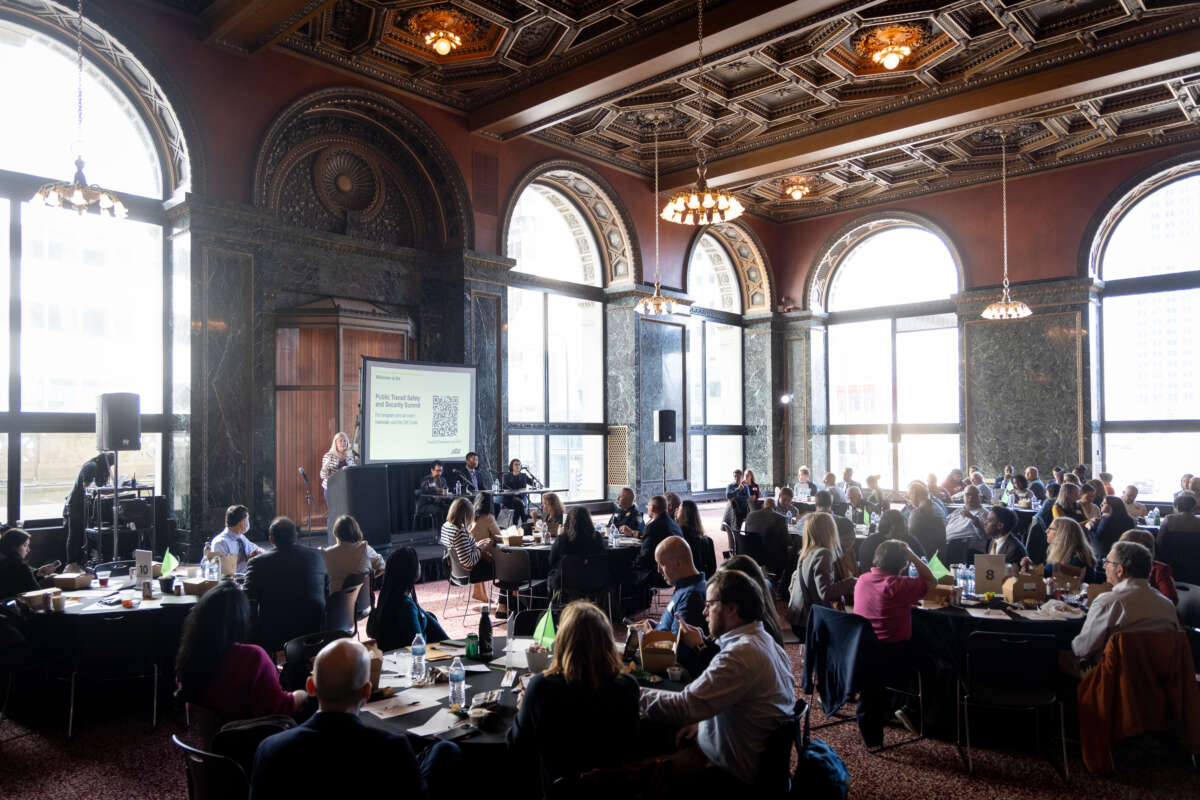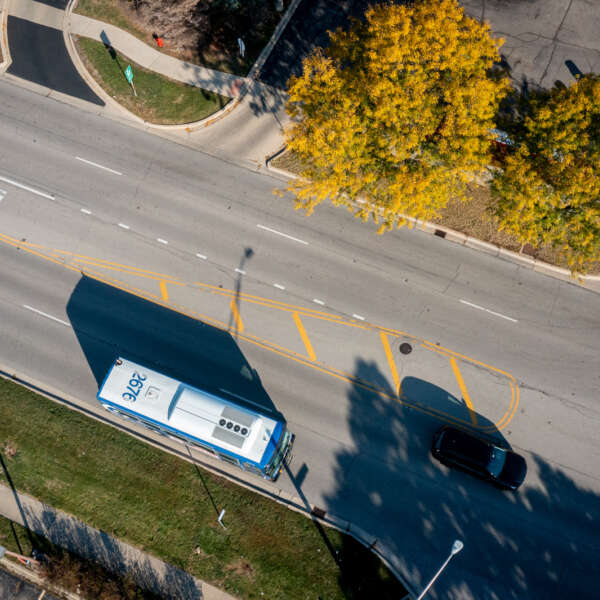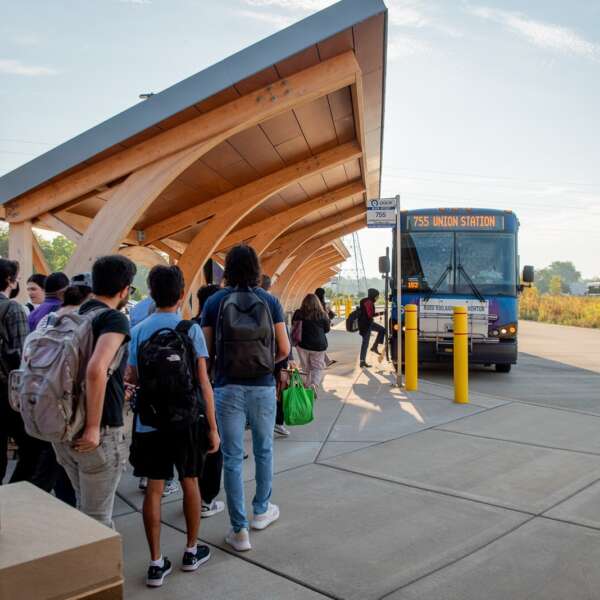RTA gathers riders and regional officials for Safety and Security Summit, announces Transit Station Activation grants
March 1, 2024
March 1, 2024

On February 27, the RTA joined with CTA, Metra, Pace, the City of Chicago, State of Illinois, and other municipal and social service partners to host a cross-sector Public Transit Safety and Security Summit, a major implementation step of the regional transit strategic plan Transit is the Answer, and a collaborative effort toward ensuring all riders and operators feel safe on transit.
The Safety and Security Summit gathered nearly 80 participants, including regional leaders and transit riders, to explore holistic solutions. Areas of focus included:
Opening remarks were offered by RTA Executive Director Leanne Redden, City of Chicago Deputy Mayor of Community Safety Garien Gatewood, and Illinois State Senator Ram Villivalam.
Redden summed up the goal of the day: “supporting strategies that make an impact” on safety — a top concern for riders, policymakers, and lawmakers alike as the region’s public transit systems work to recover from the impact of the COVID-19 pandemic.
“Together with RTA, CTA, Metra, Pace, and suburban municipalities, the City of Chicago is committed to working holistically to improve safety across the region’s public transit system,” Gatewood said. “We have to be very thoughtful on how we collaborate, not only with our partners in the city, but our partners broadly, so I’m glad we’re having this summit today.”
“I want to thank RTA for putting this on, for taking this issue as seriously as they are,” said Sen. Villivalam. “To be able to be a part of this discussion, hear the comments from people who are living and breathing this every day, is truly valuable.”
The centerpieces of the summit included:
During the panel (view a recording), Stephen Tu, Deputy Executive Officer of Station Experience at LA Metro, explained that his agency has pursued physical and design interventions to help improve safety and feelings of safety, including improving lighting on specific parts of train platforms and making train station entrances more welcoming by upgrading their appearance and playing classical music over speakers. The agency has pursued these strategies alongside others like hiring transit ambassadors, providing transit operators with de-escalation training, and working with social service agencies to provide resources to unhoused people sheltering on the transit system. LA Metro has worked to pair “tactical” interventions with “people-centered strategies” to improve safety, Tu said.
Lesley Kandaras, General Manager at Metro Transit in Minneapolis, shared that her agency uses several strategies to increase physical presence on trains and at train stations — which riders have expressed would make them feel safer — including adding fare inspectors, transit ambassadors, and private security. The agency has intentionally sought to bolster its non-police presence alongside law enforcement, Kandaras said.
The second half of the program opened with Vaishnav sharing rider data related to safety and security (view a recording and slide deck). According to RTA’s survey panel data, transit riders surveyed expressed the most concern about dangerous behavior, substance use, and damaged, broken, or dirty transit facilities. They also identified frequent transit service, cleanliness, and better lighting as changes that were the most likely to make them feel safer. CTA, Metra, and Pace also frequently survey riders and their data showed relatively high satisfaction with perception of safety on buses and commuter rail. On CTA rail, excess wait times at night and smoking or drug use on trains were reported as the biggest triggers of dissatisfaction for riders.
Breakout group discussions focused on three topic areas: enhancing personal security and addressing perception of crime on transit, incorporating transit-specific strategies into social service initiatives, and creating safer and more welcoming environments at train stations and transit stops. Key takeaways reported out from the breakout discussions included:
To see the full speaker presentations, panel discussion, and audience Q&A, watch the video recording below.
In the coming months, the RTA will produce a more detailed report of ideas generated in the summit’s breakout sessions with a focus on what we and regional agencies can best act on.
Each year the RTA hosts a Call for Projects for its Community Planning program, which provides funding and technical assistance to local governments to help foster the growth of sustainable, equitable, walkable, and transit-friendly communities.
At the safety summit, the RTA announced it is piloting a new category focused on safety and security — Transit Station Activation. Under this category, funding will be made available to cover the costs related to rail station and bus stop activation projects and activities aimed at bringing a temporary, increased presence of people to transit stations and stops as a solution to real or perceived public safety concerns.
It is envisioned these projects and activities will be simple, short-term actions or events occurring for a few hours over the course of several days that will bring residents, transit riders and visitors to the area to experience the activation project. Projects could include things like musical performers, pop up vendors, local artist showcases, beautification, community outreach, or safe walk programs. Station activation projects are expected to cost between $5,000 and $20,000 and the RTA in coordination with the service boards will select a few pilot projects in this category in 2024.
The RTA Community Planning Call for Projects, hosted jointly with the Chicago Metropolitan Agency for Planning’s Technical Assistance program, is open for applications through March 22. Read more about the types of projects that are eligible and how to apply.
Transit is the answer to many of the region’s challenges but is threatened by lack of sufficient operating and capital funding after years of disinvestment and a global pandemic. This leaves our transit agencies to face an existential crisis that neither fare hikes nor service cuts can solve while preserving a useful and equitable system.
We need your help to win sustainable funding for transit and build a better system for everyone who relies on it. Learn more and join the Transit is the Answer Coalition.
Subscribe to our Newsletter
Related Articles
 Coalition members provide feedback on ‘Transforming Transit,’ RTA’s vision for improved service and accountability
Coalition members provide feedback on ‘Transforming Transit,’ RTA’s vision for improved service and accountability
Nearly 200 riders, advocates, and other stakeholders met virtually with the RTA on February 11 for the sixth quarterly Transit is the Answer Coalition meetin...
February 20, 2025 Far South Halsted Corridor Study prepares for future Pace Pulse service
Far South Halsted Corridor Study prepares for future Pace Pulse service
An RTA Community Planning project kicked off in late 2023 as a crucial step in bringing Pace Pulse service to Chicago’s south suburbs. The Far South Halsted ...
February 19, 2025 RTA proposes reforms to prioritize capital projects, maximizing impact of funding
RTA proposes reforms to prioritize capital projects, maximizing impact of funding
RTA is proposing a historic restructuring of the region’s transit governance to maximize the impact of new operating funding and ensure all riders experience...
February 5, 2025 RTA proposes reforms to integrate fares, require accountability for faster and more reliable transit
RTA proposes reforms to integrate fares, require accountability for faster and more reliable transit
RTA is proposing a historic restructuring of the region’s transit governance to maximize the impact of any new operating funding and ensure all riders experi...
February 5, 2025 For the third year in a row, regional transit ridership was up by double-digits in 2024
For the third year in a row, regional transit ridership was up by double-digits in 2024
Ridership across the Chicago region’s transit system continued to increase throughout 2024, according to the latest data from CTA, Metra, and Pace. The regio...
January 28, 2025 RTA is seeking $1.5 billion in annual operating funding. What would that mean for your commute?
RTA is seeking $1.5 billion in annual operating funding. What would that mean for your commute?
On January 15, RTA released Transforming Transit, a vision for the regional transit system with $1.5 billion in annual operating funding supported by a stron...
January 28, 2025